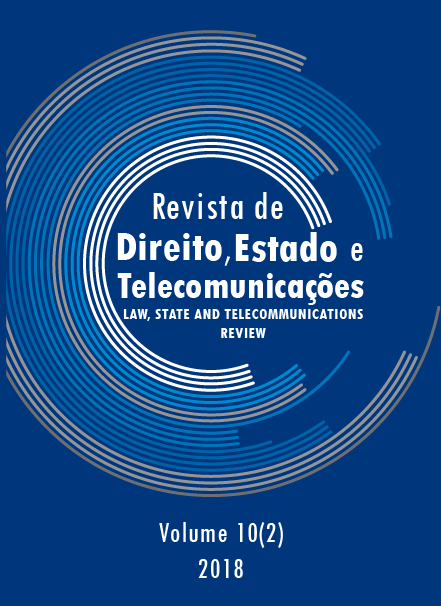Self-Regulation of the Communicational field in the Voting Process: A Legal-Political Response to the Problem of Electoral Neutrality practiced through Social Networks.
An analysis of the Colombian Case and its Impact on Latin America
DOI:
https://doi.org/10.26512/lstr.v10i2.21491Keywords:
influence of social networks, elections, responsive regulation, voting decision, ColombiaAbstract
Purpose ”“ The main proposal of this scientific article is to find some of the shortcomings that may arise from the influence of social networks on the voting decision of Colombian citizens, by reason of the logic of their own democratic system, as well as try to find contributions of the responsive theory to strengthen these fallings.
Methodology/approach/design ”“ To achieve the objective of the research, it is proposed a logical-deductive methodology with a qualitative approach. The main theories on which the research will be based are the systems theory, deliberative theory and responsive theory. The empirical support used is the case studies tool.
Findings ”“ Among the main results obtained with the research are the analysis of the influence of political candidates on the flow of information in social networks. It is recommended that Colombia strengthen its electoral regulatory system.
Practical implications ”“ The main practical contributions of this research are at the political-legal level, since this seeks to strengthen deliberative processes in social networks, and to generate critical awareness and political identity and voting.
Originality/value ”“ This research is original since it analyzes the problem of the influence of the media from another aspect not yet explored sufficiently, from the perspective of the influence of social networks on the decision of citizens to vote, which is why it has a high political and legal value, since it seeks to strengthen the constitutional and democratic order.
References
ANTUNES, J. O direito como sistema autopoiético. [s.l.]: Fundação Caoluste Gulbenkian, 1989.
AYRES, I.; BRAITHWAITE, J. Responsive Regulation. Oxford: Oxford social-legal studies, 1992.
BONAÑO, L. Las redes sociales como fuentes de informacion. Sevilla: Universidad de Sevilla, 2015.
BOTERO, C. et al. Libertad de expresión: debates, alcances y nueva agenda. Quito: Organizacion de las Naciones Unidas para la educacion, 2011.
BUSINESSWEEK, B. Cómo Hackear una Elección. 4 abr. 2016.
CARBONELL, M. La libertad de expresión en materia electoral. Mexico: Tribunal Electoral del Poder Judicial de la Federacion, 2008.
CASTELLS, M. Comunicación y poder. Barcelona: Alianza Editores, 2009.
CENTRO NACIONAL DE MEMORIA HISTÓRICA. Colombia: Memorias de guerra y dignidad. Disponible en: <http://www.centrodememoriahistorica.gov.co/micrositios/informeGeneral/estadisticas.html>. Acesso em: 14 jan. 2018.
COMANDUCCI, P. Formas de (neo) constitucionalismo: un análisis metateórico. Isonomía, n. 16, p. 89”“112, 2002.
COLOMBIA. Ley 599 del año 2000. Por la cual se expide el Código Penal. Diario Oficial. Diario Oficial No. 44.097 del 24 de julio del 2000. Bogotá, D.C. Disponible en: <http://www.secretariasenado.gov.co/senado/basedoc/ley_0599_2000.html> Acceso en: 08 de enero de 2018.
COLOMBIA. Constitución Política de Colombia del año 1991. Gaceta Constitucional No. 116 de 20 de julio de 1991. Bogotá, D.C. Disponible en: <http://www.secretariasenado.gov.co/senado/basedoc/constitucion_politica_1991.html> Acceso en: 12 de enero de 2018.
DUTTON, W. H. et al. Freedom of expression: The changing legal and regulatory ecology shaping the internet. [s.l.] UNESCO, 2010.
EL PAÍS. En 54 años, 220 mil personas han muerto por el conflicto armado en Colombia. 24 jul. 2013.
EL TIEMPO. FINANZAS DE LAS FARC: UNA GUERRA EN PAÑALES - Archivo Digital de Noticias de Colombia y el Mundo desde 1.990 - eltiempo.com. Disponible en: <http://www.eltiempo.com/archivo/documento/MAM-1308383>. Acesso em: 9 dez. 2017.
EL TIEMPO. Rumores del plebiscito por la paz. 2016.
FGV DAPP. Robôs, redes sociais e política no Brasil. 2017.
FISCALIA GENERAL DE LA NACIÓN. Condenado hacker Andrés Sepúlveda por interceptar a negociadores de paz en La Habana. Disponible en: <http://www.fiscalia.gov.co/colombia/noticias/condenado-hacker-andres-sepulveda-por-interceptar-a-negociadores-de-paz-en-la-habana/>. Acesso em: 4 ago. 2017.
FOUCAULT, M. Vigilar y Castigar. Argentina: Siglo veintiuno editores Argentina, 2003. v. 53
FOUCAULT, M. Nacimiento de la biopolítica curso: Collège de France. In: SENELLART, M.; FONTANA, A.; FRANÇOIS, E. (Eds.). . Mexico: Fondo de Cultura Económica, 2007a.
FOUCAULT, M. Historia de la sexualidad. Vol 1. Voluntad de saber. [s.l.] Siglo veintiuno editores Argentina, 2007b.
FRAZÃO, A. Premissas para a reflexão sobre a regulação da tecnologia | JOTA. JOTA, 2017.
GANDÁSEGUI, M. A. et al. Estados Unidos y la nueva correlacion de fuerzas internacional. Buenos Aires: CLACSO, 2016.
INSTITUTO NACIONAL DE TECNOLOGIAS DE LA COMUNICACIÓN. ¿Qué es (y qué no) un hacker? [s.l: s.n.].
LA REPÚBLICA. El No ha sido la campaña más barata y más efectiva de la historia. 4 out. 2016.
LEGISLATIVO, O. Normas electorales. Boletín del Instituto de Ciencia Politica Hernan Echavarria Olozaga, n. 146, p. 1”“4, 2009.
LUHMANN, Niklas. El derecho de la sociedad. [s.l.] 2003.
MITNICK, K. D.; SIMON, W. L. El arte de la Intrusión. La Verdadera Historia de las Hazañas de Hackers, Intrusos e Impostores. México D.F.: Alfaomega Grupo Editor, 2007.
NIETO, J. La Libertad y la democracia como instrumentos de dominación. p. 239”“260, 2010.
PANTOJA, A. Los nuevos medios de comunicación social. Las redes sociales, v. 12, n. 1988”“8430, p. 218”“226, 2011.
RAZÓN PÚBLICA. Las redes sociales y el plebiscito. 21 ago. 2016.
ROBINSON, J. P. Public opinion during the watergate crisis. Comunication Research, v. 1, p. 1”“15, 1974.
SEMANA. Las cinco mentiras del plebiscito que circularon por WhatsApp. 29 set. 2016.
Downloads
Published
Issue
Section
License
By submitting this paper to the Law, State and Telecommunications Review,
I hereby declare that I agree to the terms of the Creative Commons Attribution 4.0 International (CC BY 4.0).


